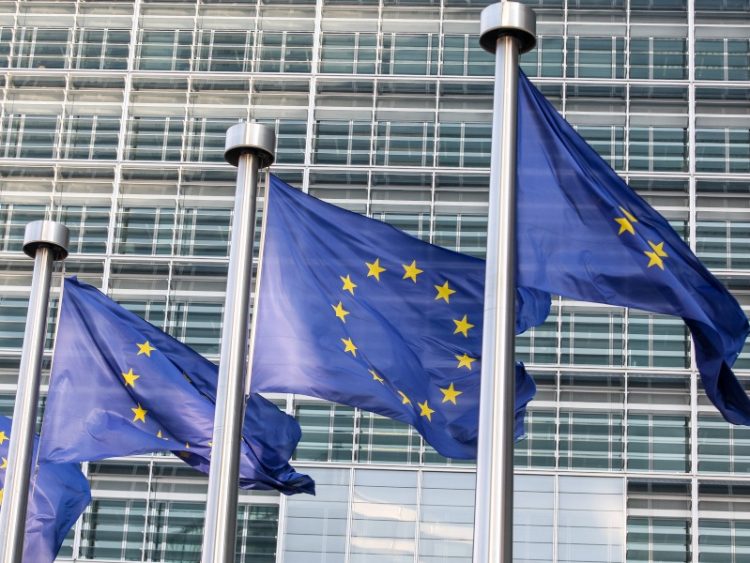The digital acts aim to rein in Big Tech monopolies and improve content moderation, though there are concerns around their enforcement.
EU lawmakers have approved the Digital Markets Act (DMA) and the Digital Services Act (DSA), the landmark pieces of legislation that aim to rein in the power of Big Tech and make the internet safer.
The European Parliament voted overwhelmingly in favour of the acts in a final vote today (5 July).
The DMA received 588 votes in favour, 11 votes against and 31 abstentions. The DSA was voted in with 539 in favour, 54 votes against and 30 abstentions.
European commissioner for internal market Thierry Breton described the result as “historic” and a “landslide vote”.
“For the first time ever, the European Commission will become the supervisor of ‘gatekeepers’ and very large platforms and online search engines,” Breton said on Twitter.
Historic! 🗳✅
Congratulations to the European Parliament for adopting both the #DSA & #DMA today.
It’s a landslide vote! pic.twitter.com/d6w4gLh0hn
— Thierry Breton (@ThierryBreton) July 5, 2022
The Digital Markets Act
The aim of the DMA is to crack down on anti-competitive behaviour by Big Tech and level the playing field in digital markets.
It will blacklist certain practices used by large ‘gatekeeper’ platforms – companies that wield a disproportionate amount of power in their markets – and enable the European Commission to carry out market investigations and sanction non-compliant behaviours.
Under the new law, companies that are marked as gatekeepers will have to allow third parties to interoperate with their own services, in order to give users greater choice and prevent them from being restricted to key apps or platforms.
Gatekeepers will no longer be able to rank their own services or products more favourably than third-party equivalents, prevent users from using third-party apps or process users’ personal data for targeted advertising (unless consent is explicitly granted).
The proposals of the DMA have previously led to clashes between EU lawmakers and large tech firms.
“The purpose of the digital single market is that Europe gets the best companies and not just the biggest,” said MEP and DMA rapporteur Andreas Schwab. “This is why we need to focus on the legislation’s implementation. We need proper supervision to make sure that the regulatory dialogue works.”
The Digital Services Act
Meanwhile, the core principle of the DSA is that what is illegal offline will be illegal online. It sets out to make the internet safer with new rules for all digital services, from social media platforms to search engines, online marketplaces and more.
The DSA follows in the footsteps of GDPR, another watershed piece of EU legislation. But where GDPR focuses on data protection and privacy and the DMA takes aim at the market dominance of Big Tech, the focus of the DSA is illegal content and the protection of users’ rights.
The obligations under the DSA include new measures to counter illegal content online and obligations for platforms to react quickly. The law also aims to impose an increased transparency and accountability on platforms, such as by making them provide clear information on content moderation or the use of algorithms for recommending content.
The illegal content targeted under the DSA includes hate speech, child sexual abuse material, scams, non-consensual sharing of private images, promotion of terrorism, the sale of counterfeit or unsafe products and copyright infringement.
Speaking after the final vote, MEP and DSA rapporteur Christel Schaldemose said the act would give platforms “the chance to regulate and adjust”.
“We are not defining what is illegal and what is not legal,” Schaldemose said. “We are saying that if it is illegal, it needs to be taken down.”
Enforcement concerns
There has been some criticism around the approved acts, with MEP Patrick Breyer saying the DSA has “failed” to be the promised game-changer to overcome “pervasive tracking online” .
“We failed to provide you with alternatives to toxic platform algorithms that will push the most controversial and extreme content to the top of your timelines”.
Elsewhere, European competition commissioner Margrethe Vestager has set up a DMA task force with around 80 officials expected to join, but critics such as Schwab have called for a larger task force to counter Big Tech, Reuters reported.
What happens next?
Once the DMA is adopted by the Council of the EU this month and the DSA is adopted in September, both acts will enter into force 20 days after their publication.
The DMA will start to apply six months following its entry into force. Companies will have a maximum of six months after they have been designated as gatekeepers to comply with the new obligations.
The DSA will be directly applicable across the EU and will apply 15 months after the entry into force. For very large online platforms and search engines, the DSA will apply four months after they have been designated as such by the European Commission.
The introduction of new digital legislation could have a knock-on effect across the Atlantic, as happened with the implementation of GDPR. There are legislators in the US who have been calling for tighter regulation of online platforms and other prominent figures who support such measures.
In May, a group of MEPs went to Silicon Valley to exchange views on the EU’s digital policy agenda with tech companies such as Google, Meta, Apple, Airbnb, eBay, PayPal and Uber.
The month before, former US president Barack Obama spoke of the need for regulation to tackle disinformation while former presidential candidate Hillary Clinton was cheering the DSA over the line.
10 things you need to know direct to your inbox every weekday. Sign up for the Daily Brief, Silicon Republic’s digest of essential sci-tech news.
Source by www.siliconrepublic.com





























